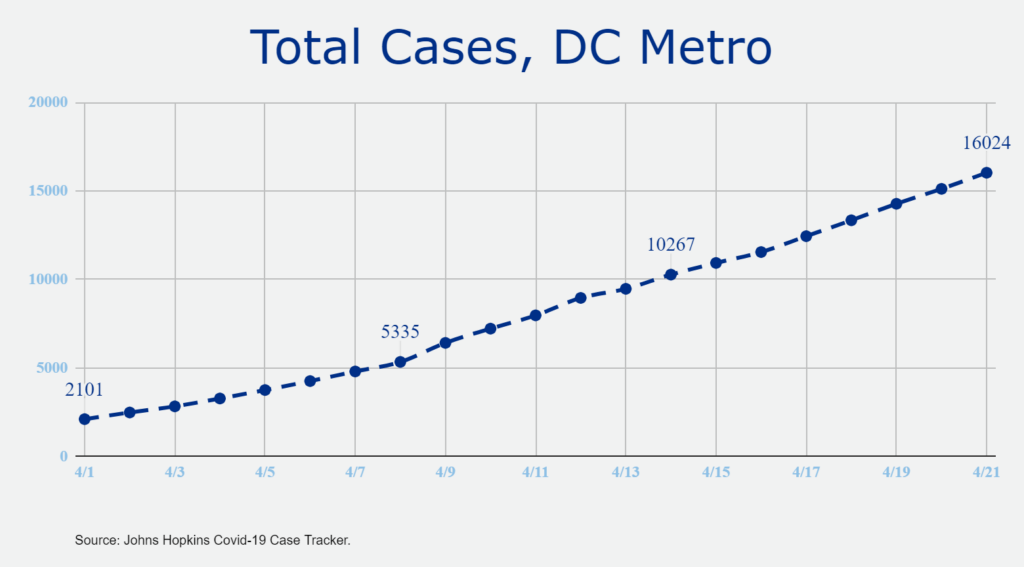An informed, coordinated reopening is the only way. Let’s make it happen.
In a 1925 speech to the American Society of Newspaper Editors, President Calvin Coolidge said, “The chief business of the American people is business. They are profoundly concerned with producing, buying, selling, investing, and prospering in the world.”
It has now been more than a month since any of us have dined out, gotten a haircut, dropped the kids off at school, visited a gym, or done hundreds of other daily activities—ones that we never imagined we were taking for granted.
It has been more than a month since many people have worked and received a paycheck.
It has been more than a month since many people have visited their workplace or seen their coworkers in person.
It has been more than a month since essential workers such as grocery store employees, first responders, nurses, and more have felt safe on the job.
It has been more than a month since many businesses have started losing revenue and laying off or furloughing workers while many others have started to close.
We are restless. We are tired of the uncertainty. And we are frustrated. We want to get back to work and restore our lives to some sense of normal. So, when will that happen?
These are perilous times, and much is riding on the timing of decisions to reopen our economy. There is no question that we must get back to work as quickly and safely as possible, and we are also deeply concerned about the health and wellbeing of our families, friends, neighbors, and coworkers.
If we get this wrong, it will only prolong and worsen the hardships we are facing. Decisions to fully reopen the economy need to be informed and coordinated.
What it means to be informed
An informed return to business means we are guided by public health experts, analysis, and data. The CDC and the White House have recommended that communities observe a steady drop in COVID-19 symptoms and cases over a two-week period before reopening schools and businesses. This will require ample testing and contact tracing. Communities should also have capacity in their healthcare system—beds, personnel, personal protective equipment (PPE)—to handle ongoing cases as well as any resurgence in cases.

Source: Washingtonian, April 24, 2020
When we do relax restrictions, we must do so in phases, reopening sections of our economy at a time. We must consistently monitor transmission rates, and if we detect a rebound, we must be prepared to respond accordingly. With diligence and patience, we can gradually reopen schools and businesses without triggering another spike in transmission.
Why must our actions hinge on public health data? The first reason is to save lives. Early studies of this pandemic warned that the United States could see hundreds of thousands of deaths. These estimates have been reduced to tens of thousands—not because the original estimates were exaggerated, but because our social distancing measures are working. Reversing course too early would be deadly and render today’s efforts meaningless.
The second reason is to avoid aggravating an already challenging business environment. Business thrives in a well-functioning system with the right public policies, appropriate regulatory guidance, the right education systems, public health and safety, and so on. And perhaps most importantly, business requires public confidence and trust.
More than 80 percent of Americans say they support social distancing measures, an unusually high degree of agreement in our typically polarized society. So, if everything opened today, would people feel safe enough to show up for work and resume their daily activities? Getting people spending and working again will require confidence in their own safety. The best way to undermine that confidence would be a rushed reopening in unsafe conditions.
What it means to be coordinated
In the Washington metro area, one out of five workers cross a state border to get to work. Many of us also routinely cross boundaries for recreation and to visit friends and family. That means that the virus crosses these lines too.
So far, Governor Hogan, Governor Northam, and Mayor Bowser have done an excellent job of coordinating their response to the pandemic. Very little time separated their decisions and it became clear early on that they would be a unified front in this fight.
We must see the same degree of coordination as plans and decisions are made to reopen the economy. Which businesses get to reopen first? What new guidelines, regulations, and requirements must be in place? How will regulations be enforced? Can frontline and other workers access enough PPE? Unifying these plans across our region will help restore confidence and accelerate our path to recovery.
The Greater Washington Board of Trade has asked the Governors and the Mayor to formalize their coordination in reopening our economy. We will also be working with them on our task force with business and community leaders to do just that while preparing for long term recovery. We know that a coordinated reopening will require significant conversations, negotiation, and planning, perhaps more than we have ever seen in our region.
We can do this
Today marks a stark milestone as the death toll from COVID-19 surpasses 50,000 in the U.S. Going forward we must be better prepared to reduce and even eliminate the threat of future pandemics. The road ahead will challenge us like never before, and we must recognize that the pandemic will result in a new normal—our lives will be changed forever. This will not be a sprint to recovery, but rather a marathon.
We must continue to work together and use our resources more effectively than thought possible. We must show a renewed willingness to adapt and change. We must question conventional wisdom and embrace creative and innovative solutions. We must build for the future. Our region is filled with smart, compassionate, resilient people. An informed, coordinated, and successful reopening is within our grasp. We can do this.
Become a member today
We need your voice at the table to make Greater Washington a place where everyone can succeed



















